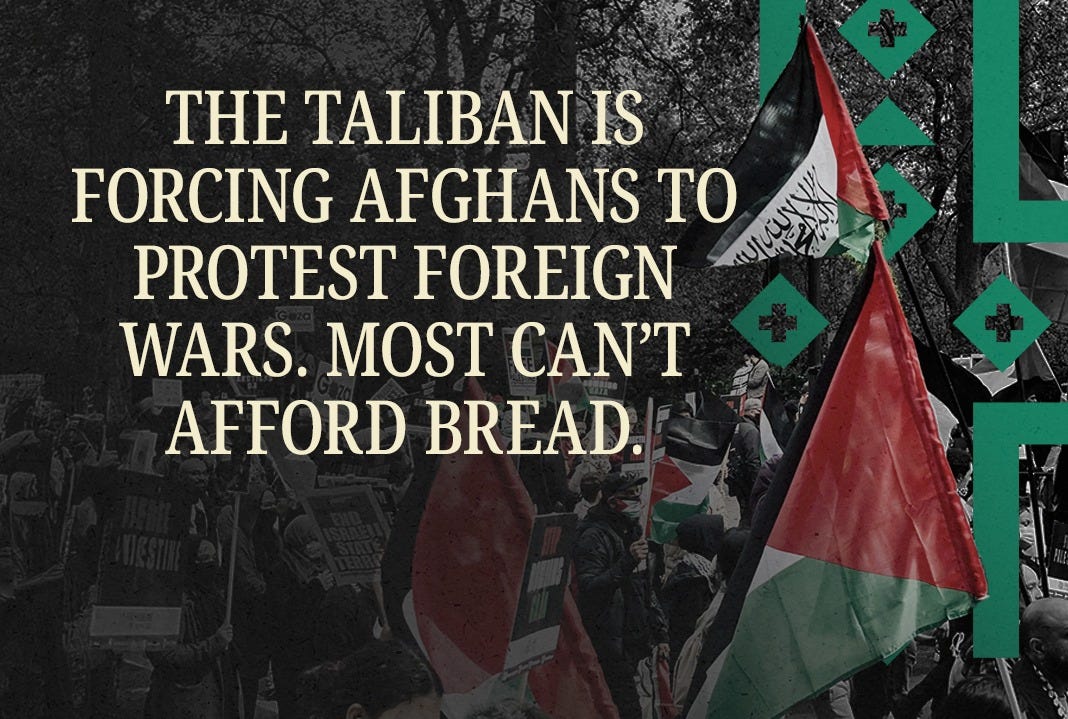The Taliban Is Forcing Afghans to Protest Foreign Wars. Most Can’t Afford Bread.
This is what authoritarian distraction looks like: stoking outrage abroad to quash dissent at home
KABUL, Afghanistan — In recent weeks, Afghans across the country were urged to take to the streets in protest—not against poverty or repression, but against a war in a foreign country.
The directive didn’t come from student leaders or civil society groups. It came in a formal letter from the Taliban’s Ministry of Higher Education, sent to university administrators and mosque leaders, calling for mass demonstrations against the ongoing war in Gaza. Multiple sources inside Kabul reported to Middle East Uncovered that the campaign was coordinated through Sharia faculties and targeted major mosques. Friday prayers were used as a launchpad for the rallies.
Afghanistan remains one of the few countries where the Taliban's authority faces no formal opposition. But it is also a country where more than 90% of the population lives below the poverty line, and millions rely on humanitarian aid to survive. The Taliban’s effort to mobilize outrage over a foreign war while suppressing domestic dissent says more about their political calculus than any genuine solidarity with the Palestinian cause.
At mosques in Kabul and beyond, chants against the war rang out, led by Taliban loyalists and radical clerics. One prominent cleric, Yahya Anabi, used his Friday sermon to call for Afghan youth to take up arms in favor of Gaza. Anabi has previously referred to Western nations as “animals” for promoting human rights and women's freedoms—language that echoes the Taliban’s long-standing rejection of international norms.
In some cases, the demonstrations were not just encouraged but coerced. Parents in the Khost province reported to Middle East Uncovered that schoolchildren were pulled from classes to join the protests. At Kabul University, students I spoke with on the condition of anonymity said they were pressured—and in some cases, allegedly forced—to attend, regardless of their political views or personal convictions.
The Taliban’s move comes amid their deepening alignment with regimes and groups hostile to the West. Taliban leaders have met with Hamas officials and maintained informal ties with the Iranian regime despite tensions over border disputes and water rights. Meanwhile, the Taliban has become the subject of an International Criminal Court investigation into crimes against humanity of gender persecution. One might think they would want to tend to their problems at home before involving themselves in conflicts abroad.
This wave of Taliban-orchestrated protest is a troubling trend whereby authoritarian regimes use foreign conflicts to distract from domestic repression and economic collapse. It also underscores the Taliban’s reliance on spectacle over substance—a way to flex power and reassert ideological control in a country where disillusionment is widespread and options for resistance are dangerously limited.
In the background are the Fatemiyoun brigades—Shia Afghan militias once deployed by Iran to prop up Bashar al-Assad in Syria. With millions of Afghan refugees still in Iran, many fear similar coercion tactics could return, forcing young men into proxy wars they never signed up for.
Meanwhile, the real crisis in Afghanistan deepens. Food insecurity, unemployment, and an eroded education system weigh on a population still recovering from decades of conflict. For many Afghans, a protest against a foreign war is a luxury they cannot afford—not politically, not ethically, and certainly not economically.
The international community should be wary of the Taliban’s attempts to hijack global conflicts as a means of tightening control at home. But more importantly, it must not lose sight of the Afghan people—those whose voices have been silenced under a regime more invested in international theater than in alleviating the suffering of its own people.
Instead of engaging with the Taliban’s spectacle, we must direct our support toward the Afghans risking their lives for change. That means funding underground schools for women and girls, empowering opposition figures who continue to resist Taliban rule, and standing with the everyday citizens enduring an impossible reality under a violent, radical regime. The world’s focus should not be on the Taliban’s stage, but on those bravely defying it.
Middle East Uncovered is powered by Ideas Beyond Borders. The views expressed in Middle East Uncovered are those of the authors and do not necessarily reflect the views of Ideas Beyond Borders.



